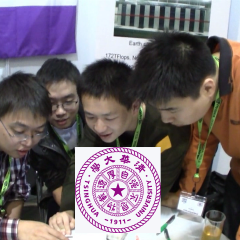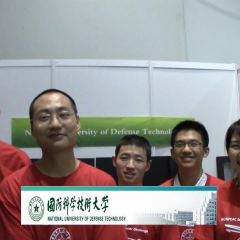China is sending two teams to the ISC Student Cluster Competition (iSCC) this June in Hamburg. Tsinghua University and the National University of Defense Technology were survivors of a rigorous Hunger Games-like play-in competition; they had to beat out four other teams for the coveted Hamburg spots. Chinese server/services vendor Inspur is providing hardware and underwriting both teams.
(The competition was exactly like The Hunger Games if the hit book/movie characters had been forced to build their own clustered systems and achieve the highest scores on a set of HPC benchmarks. And if the losers weren’t killed – they just didn’t get to go to Hamburg. Other than that, the Chinese cluster competition was exactly like The Hunger Games; details here.)
We don’t have a lot of first-hand knowledge about Tsinghua University. It’s based in Beijing, about 14 km from Qianmen Quanjude Roast Duck Restaurant – home of the best Beijing Duck (Peking Duck) in the world. Mao, Khrushchev and Castro ate there, and so did Nixon on his visits. They have a way with ducks, to say the least.
And it looks like Tsinghua has a way with technology. They’re perennially ranked as one of the top three science and technology universities in China – sort of like MIT in the U.S. They recently marked their 101st anniversary, and probably want to bring home a cluster competition trophy or two as a little birthday present to themselves.
The National University of Defense Technology (NUDT) is the other competitor from the Middle Kingdom. We know a bit more about them. NUDT as an institution rocketed onto the world stage when they unveiled Tianhe-1A, the world’s fastest supercomputer, in 2010. This 2.56 Petaflop super was also the largest hybrid system in the world, using 14,336 Xeon processors combined with 7,168 NVIDIA M2050 Tesla GPUs.
NUDT first appeared on the cluster sports scene when they participated in the SC11 Student Cluster Competition in Seattle last fall. They brought a GPU-heavy system and weren’t given much of a chance to win by SCC observers.
While some of the competition benchmarks were GPU-friendly others were not, and it didn’t seem that a system so heavily reliant on GPUs would be able to yield as much overall performance as the more balanced configurations – unless the students were somehow able to optimize the complex codes to take advantage of their GPUs. Which is exactly what they did, and in impressive manner.
NUDT didn’t win the overall competition. They finished just barely behind Team Taiwan (another team that optimized their codes for GPUs), but came within an eyelash of winning it all. In the intra-China play-in competition, NUDT finished second yet again – this time to Tsinghua University.
Both of these Chinese teams have to be regarded strong competitors in Hamburg. They made it through the tournament in China running the same apps they’ll be running in Hamburg, on the same hardware, in competition conditions. That’s damned good training for the big show, and maybe more preparation than the American and German teams have put in. Is it enough to land the Middle Kingdom at the top of the iSCC leader boards? We’ll see, but they have to be early favorites.
Posted In: Latest News, ISC 2012 Hamburg
Tagged: supercomputing, Student Cluster Competition, HPC, NUDT, ISC 2012, Tsinghua University, Inspur


